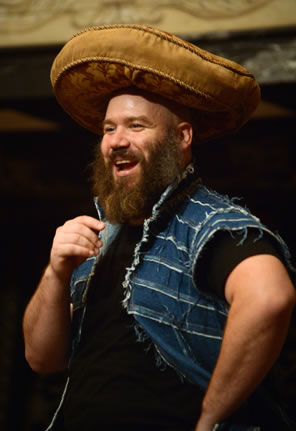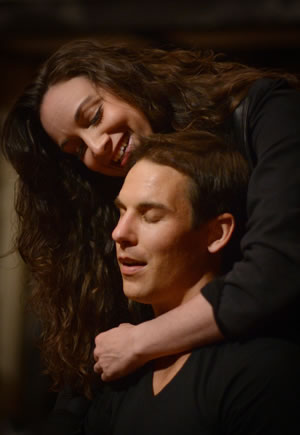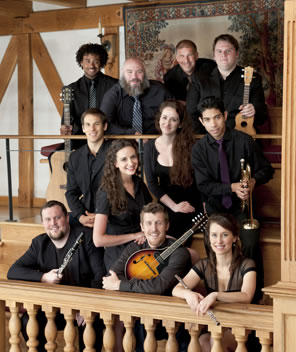Henry IV, Part One
Playing Falstaff with Blunt Force
American Shakespeare Center, Blackfriars Playhouse, Staunton, Va.
Saturday, September 7, 2013, C-6&7 (center stalls)
Directed by Jim Warren

Rick Blunt plays Falstaff playing Henry IV during the play-acting scene at the Eastcheap inn in the American Shakespeare Center's production of Henry IV, Part One at the Blackfriars Playhouse. Below, Lady Percy (Stephanie Holladay Earl) with Hotspur (Patrick Midgley). Photos by Pat Jarrett, American Shakespeare Center.
Falstaff has come down through the ages as William Shakespeare's greatest comic character because he combines all that's good—wisdom, wit, love, age—with all that's bad—debauchery, thieving, gluttony, age. Out of Falstaff descended Fagen and Santa Claus. On the American Shakespeare Center's Blackfriars Playhouse stage in 2008 and 2009, James Keegan gave a superbly intelligent portrayal of the fat knight in all three of his incarnations in Henry IV, Parts One and Two and The Merry Wives of Windsor.
Despite Falstaff's worldly keenness and biblical wisdom, though, he was possibly originally played by Will Kemp, the buffoon specialist actor who originated Peter in Romeo and Juliet and Dogberry in Much Ado About Nothing, and probably played Lance in Two Gentlemen of Verona, Launcelot Gobbo in Merchant of Venice, and Bottom in A Midsummer Night's Dream. Reconciling these character types with Falstaff takes some doing.
It takes Rick Blunt. I have long considered Blunt, a longtime member of the ASC's touring troupe (this year dubbed the World's Mine Oyster Tour), a reincarnation of Kemp, so his Falstaff might be as close to William Shakespeare's original rendering—if, indeed, Kemp originated the part—as we might ever see. For Blunt, playing Falstaff has been his career dream; he even bears a tattoo of Falstaff's line, "Is not the truth the truth?" But, interestingly, he shapes the great comic role to his own comic self, and it is winning work.
In Henry IV, Part One, Blunt gives us an earthy version of Falstaff, his hairy gut often on display, his scraggly beard a bramble's nest with, perhaps, things that bite living in it. He appears in act one, scene two, with his pants down around his ankles, displaying a pair of brightly cartooned Pac Man Fever boxer shorts, and he spends the majority of this scene walking around the stage in this condition. Blunt's gut-eral performance is driven not only by his own potty humor—as written by Shakespeare—but also by Prince Hal's anatomical insults: listening to Blunt and Patrick Earl's Hal engage in fat and fart jokes, you might think you were in a Farrelly Brothers movie.
Blunt's special acting talent is his skill at working an audience, as was the case, reportedly, with his theatrical ancestor, Kemp. Blunt thrusts his belly into people's faces. He gives his asides to individuals and will follow with a fist bump. He displaces a patron when he needs a seat to catch his breath. He calls on the audience members sitting on the gallant stools on stage to serve as his rag-tag army. He also enlists the audience to help him with his famous honor speech. In a most delightful moment, Falstaff picks a woman's purse, pulling out a candy bar and eating it with Hal as a willing accomplice.
The casting of Blunt as Falstaff twice over (the troupe is also performing The Merry Wives of Windsor, and Blunt is playing another iconic Shakespeare character, Iago, in Othello) is part of the company's celebration of its 25th anniversary. What started out in 1988 as a touring company called the Shenandoah Shakespeare Express built the replica Blackfriars Playhouse in Staunton, Va., in 2002 and dropped the Express from its name, then changed its moniker to the American Shakespeare Center in 2005. The touring program, of which Shakespeareances.com is a sponsor, is still a company mainstay. The company has always specialized in text-centric, original practice productions, but in its early days, the actors would sit among the audience and on the outskirts of the stage when they were not playing.
This Henry IV utilizes that convention. The actors wear black shirts and pants, placing knights tunics, vests, aprons, jackets, and dresses over them for various roles (costumes by Erin M. West). Characters on stage will make direct physical references to characters sitting off stage when speaking about them. For example, when Hal mimics Hotspur, Earl delivers the lines tauntingly toward Patrick Midgley, who plays Hotspur, sitting in the front row. When he describes his father, Hal directs his anger toward David Millstone, who plays Henry IV, sitting at the back corner of the stage. Midgley and Millstone, in turn, watch Earl dispassionately, yet intently. And when Midgley's Hotspur and Millstone's Henry talk deridingly of Hal, they turn to Earl sitting off stage, who replies with stoic stillness. The device is more than a clever cleaving of the fourth wall; it provides a sense of the play's overall imaginative force, demonstrating how its various character arcs soar apart from each other yet intertwine at key points and lace into a tidy knot at the end.
With this production, director Jim Warren proves that Henry IV, Part One, stands alongside Twelfth Night as one of Shakespeare's best comedies. Like Twelfth Night, it is one of Shakespeare's greatest ensemble pieces, despite Falstaff's dominance. From title role to filler parts, every character is a distinct personality, and this company is strong enough to make the whole a solid piece of work. A couple of standout performances are turned in by Emily Joshi-Powell, who plays Mistress Quickly as a young woman, full of spirit and fun, and Joey Ibanez, who pulls off a trifecta: a silly Peto, a hapless Edmund Mortimer (in a humorous scene with Bridget Rue's Welsh-speaking Lady Mortimer), and an over-the-top Douglas who substitutes his pistol for valor when it's convenient to do so. Falstaff's fall in his fight with Douglas is the result of a bullet to his heart; what stops the bullet is something literally and figuratively near and dear to Sir John Sack and Sugar's heart.
Meanwhile, the play's moral centerpiece is Hal's transitioning from wayward youth to hero prince en route to his eventual place in history as one of England's greatest monarchs. Earl doesn't go too psychologically deep in his portrayal of Hal, but through his expert delivery of the verse he gives us Hal's conflicted state. Yet, it is seen most in his silence as he listens to his father openly desire Hotspur as his eldest son and accuse Hal of being a degenerate traitor. This would seem to be Hal's great awakening, but Earl takes Hal's early "I know you all" soliloquy at face value: he is only playing the part of scofflaw. In the play-acting scene at the tavern when it comes to his decision of whether to banish plump Jack Falstaff, Earl delivers Hal's lines, "I do, I will" with an inflection of certainty. And yet, a little later when he finds Falstaff asleep behind the arras, Hal kisses him on the forehead.
 Midgley plays Hotspur as molecular energy about to combust through his muscular frame. For Midgley's Hotspur, no honor is too great to achieve, the world is not big enough to play in, and his sculpted chest is not large enough for his heart. Though he plays an intense Hotspur, he plays the part straight. He lets the comedy of the lines carry their own weight without adding any inflections himself, and he uses Hotspur's inherent ego as a building block for the character without adding any overriding pathology. In Midgley's performance, Hotspur's self-centeredness becomes his funniest trait as it leads to intentional disrespect for the Hals and popinjays of the world, barely contained disrespect for the king and court, and unintentional disrespect for his father and uncle.
Midgley plays Hotspur as molecular energy about to combust through his muscular frame. For Midgley's Hotspur, no honor is too great to achieve, the world is not big enough to play in, and his sculpted chest is not large enough for his heart. Though he plays an intense Hotspur, he plays the part straight. He lets the comedy of the lines carry their own weight without adding any inflections himself, and he uses Hotspur's inherent ego as a building block for the character without adding any overriding pathology. In Midgley's performance, Hotspur's self-centeredness becomes his funniest trait as it leads to intentional disrespect for the Hals and popinjays of the world, barely contained disrespect for the king and court, and unintentional disrespect for his father and uncle.
It also leads him to take his wife for granted, except that, as played by Stephanie Holiday Earl, she is his kindred spirit who has come to realize that because she can't rein Hotspur in she may as well ride him into his uncertain future. The playing of Holiday Earl and Midgley reveals that it is their great love and honest attraction for each other that redeem Hotspur from being nothing more than an arrogant jerk. He is, after all, a man who inspires admiration among his peers and envy in the king who considers him his most dangerous foe.
Yet Henry's real enemy, and the man he should most envy, is Falstaff, the old, fat knight who not only seems to be corrupting the king's son but also receives much more affection from the prince than the real father does. Blunt's Falstaff has no intention of competing with the king, though; he just is what he is, and Blunt is what Falstaff is, a gregariously funny guy, the most lovable loser of all time, inviting Hal and the rest of us along on his escapades, from Gads Hill to the Eastcheap inn to the Battle of Shrewsbury. Sure, there are moral ambiguities in all of these characters, especially Falstaff, but what we get most out of this production is a belly full of laughs.
Eric Minton
September 19, 2013
Comment: e-mail editorial@shakespeareances.com
Start a discussion in the Bardroom




 Find additional Shakespeareances
Find additional Shakespeareances